Schlagwort: ‘MedIT’
Daimler and Benz grant for research into innovative blood pressure measurement technology
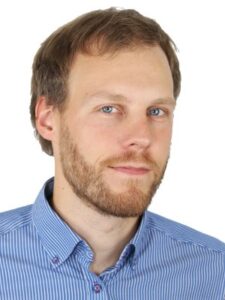
© MedIT
Markus Lüken was awarded a scholarship for the year 2025 by the Daimler and Benz Foundation for his research work on monitoring blood pressure fluctuations with inconspicuous sensors.
After studying electrical engineering and information technology at RWTH Aachen University, Markus Lüken completed his doctorate at the Chair of Medical Information Technology (MedIT) with a thesis on the inconspicuous monitoring of gait stability in Parkinson’s patients. Lüken is currently head of the Biomedical Measurement Technology and Signal Processing working group at MedIT. His research focuses on non-invasive sensor systems and machine learning for medical diagnostics. In his current project, he aims to develop a non-invasive, patient-friendly way of monitoring blood pressure in everyday clinical practice, in order to provide the best possible assessment of the patient’s condition.
According to the foundation’s website: ‘Fluctuations in blood pressure and especially high blood pressure can have serious health consequences, but often go undetected.’
In accordance with this relevance, the young scientist is developing an inconspicuous sensor system that is integrated into the patient’s bed and serves to continuously monitor blood pressure trends without the aid of the conventional cuff. By combining multimodal, innovative and non-detectable measurement methods, parameters are collected that allow conclusions to be drawn about the development of blood pressure.
The Daimler and Benz Foundation has set itself the objective of strengthening the autonomy of the next generation of scientists and of supporting the academic careers of young and committed scientists after their doctorates, irrespective of their disciplines.
Further information on the 2025 scholarship holders is available on the official website of the Daimler and Benz Foundation.
‘Colloquium Biomedical Engineering and Related Fields’ – Invitation to the current lecture
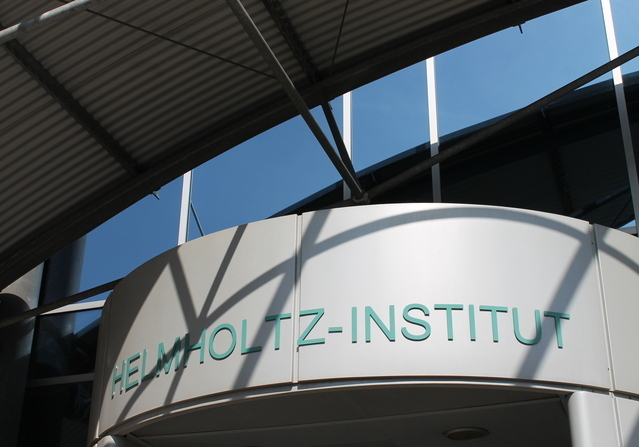
The lecture, entitled ‘Mobility in older adults‘, will be moderated by Professor Steffen Leonhardt, Chair holder of the Medical Information Technology (MedIT) at the Helmholtz Institute for Biomedical Engineering at RWTH Aachen University, on Thursday, 30 January 2025.
Professor Wiebren Zijlstra, Head of the Institute of Movement and Sport Gerontology at the German Sport University Cologne, will deliver a presentation on factors which underly age-related changes in mobility based on experimental laboratory-based studies as well as studies of real-life mobility.
In the abstract that precedes the lecture, Professor Zijlstra outlines the various challenges presented by mobility in daily life, such as finding the way to a target location, while ensuring safe progression by continuously perceiving the environment and adapting locomotion if needed, e.g. in order to avoid potential collisions with obstacles, other pedestrians, or traffic. Such adaptive control of locomotion requires physical and cognitive functions and, even without overt pathological conditions, age-related changes in functioning may cause older persons to show a reduced mobility and an increased fall risk. Mobility limitations are associated with reduced quality-of-life, a plethora of negative health outcomes, and an increased morbidity and mortality. According to Professor Zijlstra, it is important to understand factors that contribute to an age-related reduction in mobility and when possible develop effective interventions.
„Results of recent studies show that physical capacity alone is poor in predicting older adults’ mobility performance in real-life. Other studies show that age-related changes in cognition, especially the so-called executive functions, are associated with a reduced mobility and an increased fall-risk,“ the specialist points out.
Executive functions are crucial for adaptive locomotion, as they enable a person to monitor behaviour in relation to the environment and to adapt behaviour when necessary. By focusing on two key components of executive functions (cognitive flexibility and inhibitory control), this talk will also present recent results from studies that aim to better understand the role of cognitive control during mobility-related tasks.
Despite an abundance of mobility studies and increasing insight in factors that negatively impact on mobility in older persons, it is yet unclear to what degree the combination of these factors predicts real-life mobility, Professor Zijlstra continues in his apstract. Only a limited number of recent studies considered various potential mobility determinants by combining measures from physical, cognitive, and psycho-social functioning.
„These studies showed that real-life mobility cannot yet be predicted very well. Taken together, these findings necessitate more well-focused studies of real-life mobility in various groups of older adults, as well as experimental studies of older adults’ performance of complex mobility tasks which resemble daily life conditions,“ he concludes.
The ‘Colloquium on Biomedical Engineering and Related Areas’ is a regular series of events organised by RWTH Aachen University. The objective of the series is to facilitate interdisciplinary education in these fields and to encourage the interdisciplinary exchange of ideas.
A cordial invitation is extended to all students, clinicians, engineers and scientists to attend this illuminating lecture and engage in discourse with experts in the field of biomedical engineering.
The event will take place from 5 to 5:45 pm at the Helmholtz Institute for Biomedical Engineering at RWTH Aachen University, Pauwelsstraße 20, 52074 Aachen, Germany, seminar room 2.70. It will be coordinated by Prof. Dr. Klaus Radermacher, Chair of Medical Engineering, RWTH Aachen University. For further information please contact the secretariat at meditec@hia.rwth-aachen.de or call +49-(0)241-80 23870.
‘Colloquium Biomedical Engineering and Related Fields’ – Invitation to the current lecture

The lecture, entitled ‘Electrical impedance of muscle: from muscular dystrophy to Mars’, will be moderated by Professor Steffen Leonhardt, Chair holder of the Medical Information Technology (MedIT) at the Helmholtz Institute for Biomedical Engineering at RWTH Aachen University, on Wednesday, 25 September 2024.
In his presentation, Dr Seward B. Rutkove, Nancy Lurie Marks Professor of Neurology, Harvard Medical School Chair, Department of Neurology, Beth Israel Deaconess Medical Center, will talk about innovations in the field of skeletal muscle electrical impedance. His lecture will focus on primary disorders that impact muscle, including muscular dystrophies, amyotrophic lateral sclerosis, muscle injury and the effects of unloading, such as those caused by microgravity or partial gravity. He will then discuss methods and technologies for measurement, and review the data collected in a wide range of conditions in both human and animal models.
„It is necessary to clarify which analytical approaches are currently available and in which direction future research will go“,
indicates Dr Rutkove in his abstract, setting the scene for the discussion that will follow.
The ‘Colloquium on Biomedical Engineering and Related Areas’ is a regular series of events organised by RWTH Aachen University. The objective of the series is to facilitate interdisciplinary education in these fields and to encourage the interdisciplinary exchange of ideas.
A cordial invitation is extended to all students, clinicians, engineers and scientists to attend this illuminating lecture and engage in discourse with experts in the field of biomedical engineering.
The event will take place from 5 to 5:45 pm at the Helmholtz Institute for Biomedical Engineering at RWTH Aachen University, Pauwelsstraße 20, 52074 Aachen, Germany, seminar room 2.70. It will be coordinated by Prof. Dr. Klaus Radermacher, Chair of Medical Engineering, RWTH Aachen University. For further information please contact the secretariat at meditec@hia.rwth-aachen.de or call +49-(0)241-80 23870.
New lecture in the series ‘Colloquium Biomedical Engineering and Related Fields’
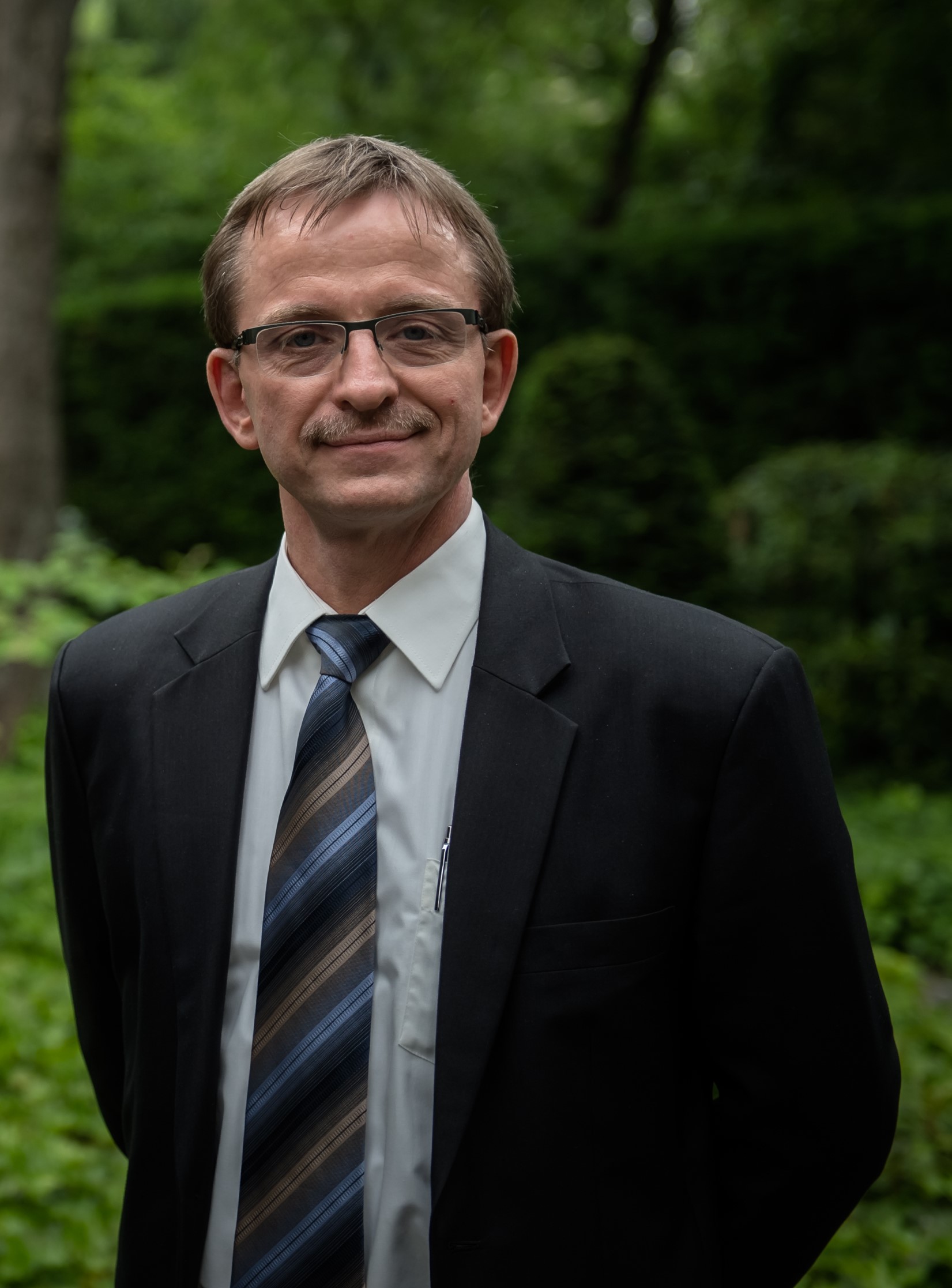
© Andreas Endermann
Professor Steffen Leonhardt, holder of the Chair of Medical Information Technology (MedIT) at the Helmholtz Institute for Biomedical Engineering at RWTH Aachen University, will moderate the new lecture: ‘Continuous In-Vehicle Health Monitoring Enabled with Multimodal Signal Fusion’ on 11 July 2024.
We are delighted to welcome Dr Joana M. Warnecke from the Peter L. Reichertz Institute for Medical Informatics at the Technical University of Braunschweig and the Hannover Medical School. Dr Warnecke will present her pioneering research into continuous health monitoring in vehicles. Her work focuses on the development of a redundant sensor system that enables reliable measurement of heartbeat and respiration rate. These systems use a Convolutional Neural Network (CNN) based architecture for data fusion and take into account additional sensors such as steering wheel angle and acceleration to improve signal quality.
“Our findings indicate that over half of the driving time can be utilized for in-vehicle heartbeat and respiratory rate monitoring, highlighting the efficiency and practicality of the proposed approach,”
states Warnecke.
This technology could make a significant contribution to the early detection of cardiovascular and chronic respiratory diseases by being seamlessly integrated into everyday life.
The ‘Colloquium on Biomedical Engineering and Related Areas’ is a regular series of events organised by RWTH Aachen University. The aim of the series is to provide an interdisciplinary education in these fields and to promote the interdisciplinary exchange of ideas. All students, clinicians, engineers and scientists are invited to attend this exciting lecture and exchange ideas with experts in the field of biomedical engineering.
The event will take place from 5 to 5:45 pm at the Helmholtz Institute for Biomedical Engineering at RWTH Aachen University, Pauwelsstraße 20, 52074 Aachen, Germany, seminar room 2.70. It will be coordinated by Prof. Dr. Klaus Radermacher, Chair of Medical Engineering, RWTH Aachen University. For further information please contact the secretariat at meditec@hia.rwth-aachen.de or call +49-(0)241-80 23870.
Excellent results at the Workshop Biosignals 2024
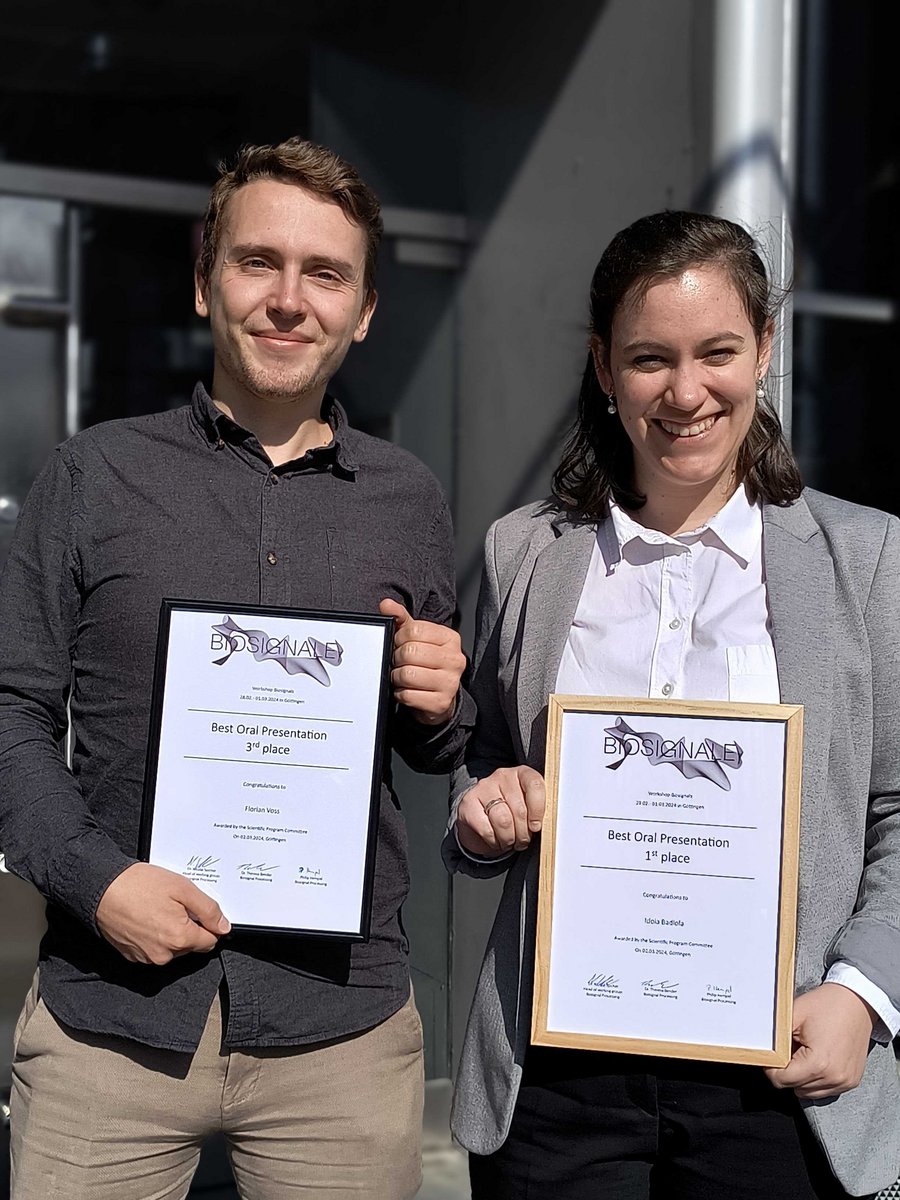
© Medical Information Technology (MedIT)
Idoia Badiola and Florian Voss from the Chair of Medical Information Technology (MedIT) at the Helmholtz Institute for Biomedical Engineering at RWTH Aachen University successfully participated at the Workshop Biosignals 2024, which took place from 28th February to 1st March in Göttingen.
The technical committees “Biosignals” and “Magnetic Methods in Medicine” of the German Society for Biomedical Engineering cordially invited all interested scientists, especially from the field of early career researchers, to the Workshop Biosignals.
Accepting the challenge Idoia was awarded the 1st place in the category “Best Oral Presentation” for her presentation “Mapping of peripheral venous hemodynamics using a low-cost camera: a proof-of-concept”. Florian achieved the 3rd place with his presentation “Camera Fusion for Improving Body Part Segmentation of Preterm Infants”.
“Congratulations to our colleagues Idoia Badiola and Florian Voss on their outstanding achievements”,
commented MedIT.
With this event, the committees are continuing a more than 20-year tradition of successful collaboration. Important components of the workshop were keynote speeches by young scientists as well as detailed poster presentations with short talks in which each submitted paper could be discussed constructively and critically. Submissions on biosignal analysis, biomagnetism and new related topics such as artificial intelligence and medical data science were welcome.
The event was hosted by the Biosignal Processing Group of the University Medical Centre Göttingen and supported by the Medical Image- and Signal Processing Working Group of the German Association for Medical Informatics, Biometry and Epidemiology.
“Special thanks go to the organisation team of the workshop, particularly Dr. Nicolai Spicher, Theresa Bender and Philip Hempel”,
added the Chair of Medical Information Technology.
Further information on the Workshop Biosignals can be found on the event’s homepage.
Find out more about the Chair of Medical Information Technology (MedIT) here.
Prof Leonhardt elected to the German Academy of Science and Engineering
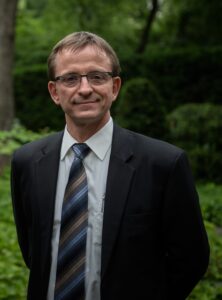
© Andreas Endermann
The German Academy of Science and Engineering, a prestigious private not-for-profit scientific academy, has recently welcomed 39 new members. Among them is Professor Leonhardt, Chair of Medical Informatics. This expansion of the Academy’s expertise strengthens its ability to provide valuable science-based advice to policymakers and society as a whole. Congratulations!
Established in 2002, the German Academy of Science and Engineering plays a crucial role in advising policymakers on science and technology policy. It operates under the umbrella term acatech, a combination of ‘academy’ and ‘technology’, and has a significant impact beyond national borders, representing the interests of German technological sciences at both national and international levels.
In June 2017, Federal President Frank-Walter Steinmeier became the patron of the German Academy of Science and Engineering, highlighting the institution’s dedication to promoting scientific and technological excellence.
We, at the Faculty of Electrical Engineering and Information Technology, are proud to congratulate Prof. Steffen Leonhardt on his election to the Academy.
Delegation visits IIT Madras
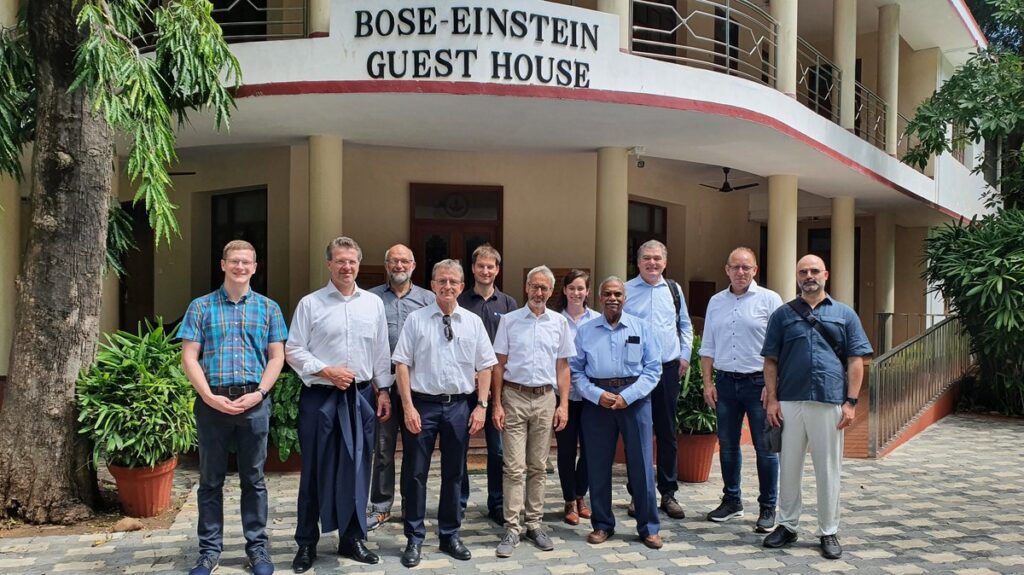
Professor Leonhardt and colleagues © MedIT
The Institute of Medical Information Technology (MedIT) on the road in Chennai, India.
Professor Leonhardt and his colleagues from MedIT and other RWTH institutes visited India in late September, specifically the Indian Institute of Technology (IIT) Madras in Chennai. The aim of this visit was to finalise the proposal for an Indo-German Graduate College.
IIT Madras is a premier university for engineering sciences in India, established in 1959 with assistance from the former West German government. The plans for this were arranged in 1956 during a meeting between Jawaharlal Nehru and Konrad Adenauer. The IIT Madras campus spans 2.5 sq km and has a dense forest. Previously, it belonged to the Guindy National Park. Conservation measures are in place for the campus where most students and staff also reside. A variety of wildlife, such as deer, antelope, axi deer, monkeys, snakes, and scorpions, can be found inhabiting the area.
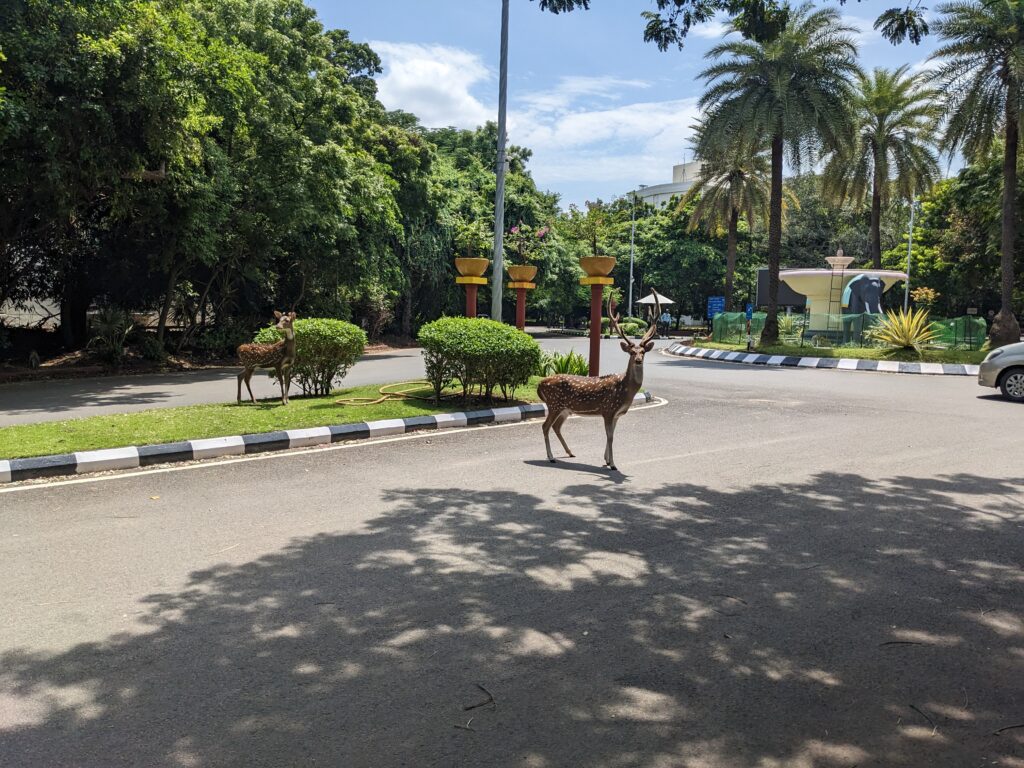
© MedIT
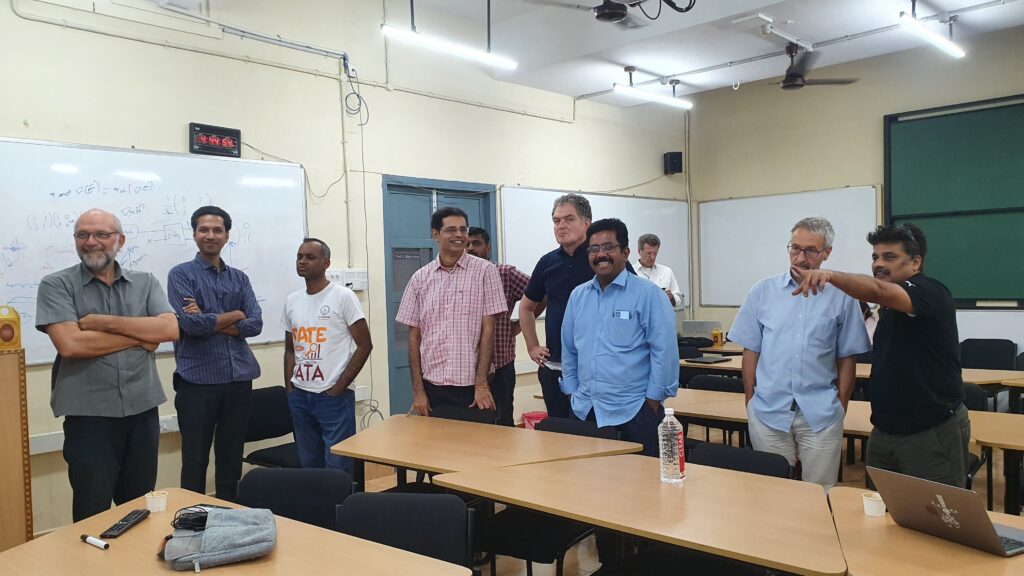
© MedIT
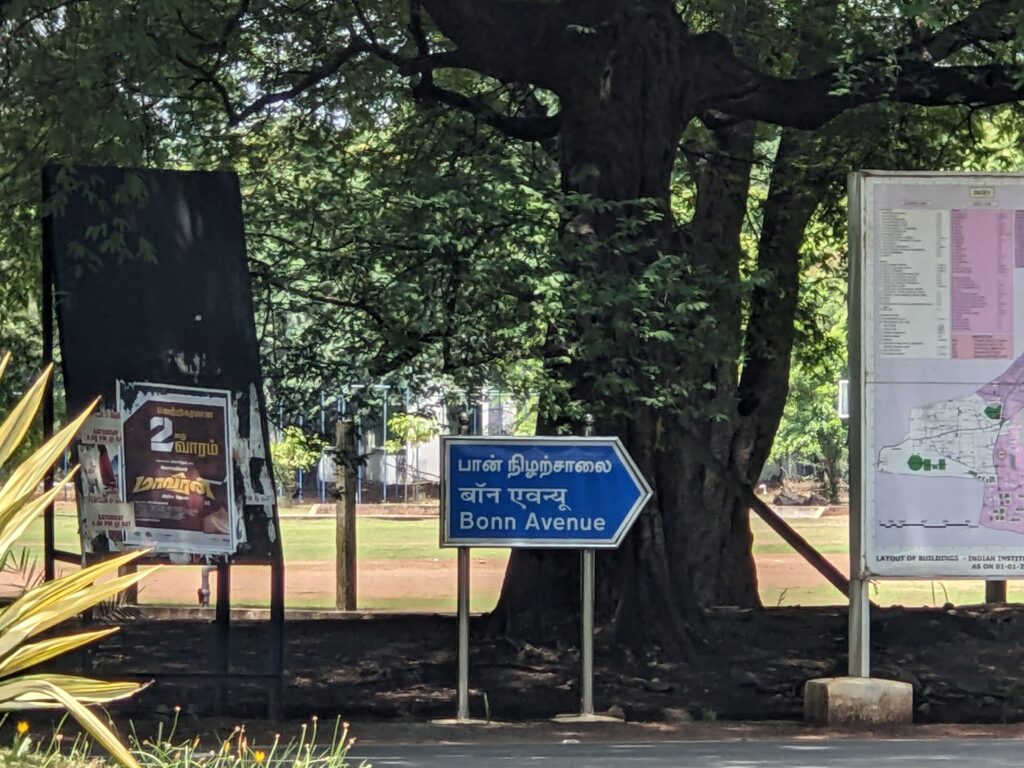
© MedIT
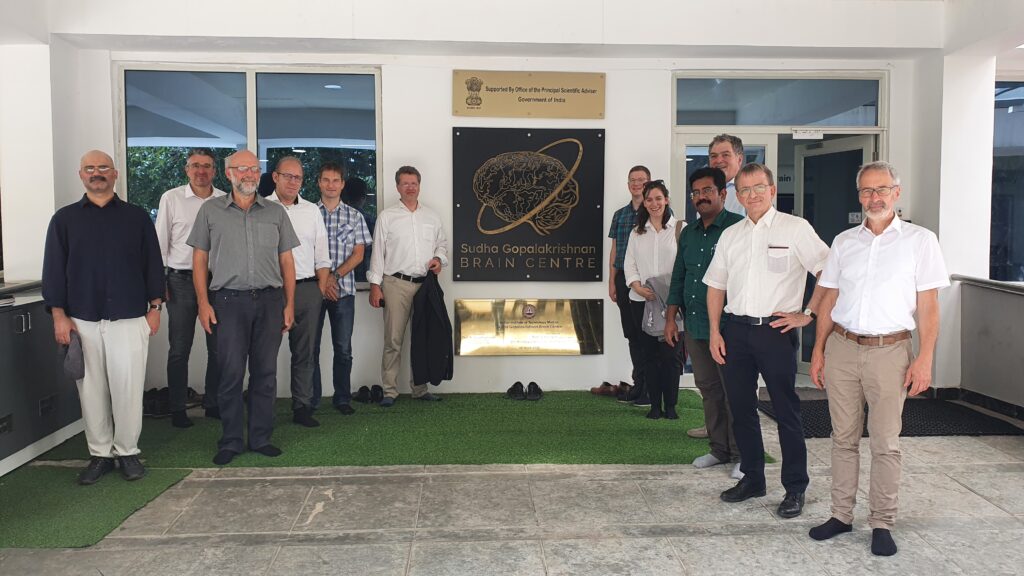
© MedIT
For more news, visit the MedIT website.
MedIT looks back on 20 years of history

Happy Birthday!
Since the founding of the Chair of Medical Information Technology (formerly the Philips Chair of Medical Information Technology) on 01.08.2003, a lot has happened: new research areas have been opened up, international collaborations have been established, a branch office has been opened and many young PhD students have graduated here.
MedIT is grateful and proud of this development and would like to share it with old and new colleagues, partners and friends.
To mark this occasion, an anniversary celebration will take place in September 2023, which will also include a symposium in which MedIT would like to discuss the past and future of the chair as well as medical technology in Aachen and the world.
Further information on the lecture programme: Das MedIT feiert sein 20-jähriges Bestehen (rwth-aachen.de) (only in german)



